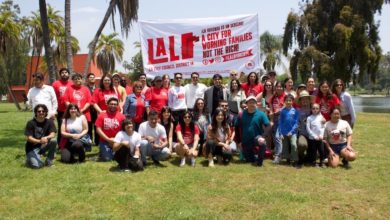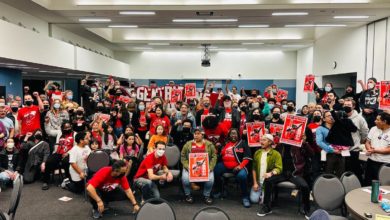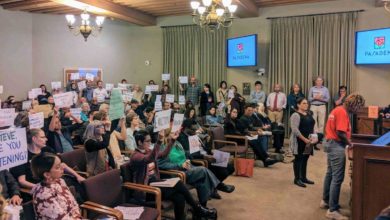On April 25, more than 170 people participated in a day-long socialism conference in Los Angeles hosted by the Party for Socialism and Liberation. It was held under the banner “Socialism: the time is now.”
 |
The conference was conducted entirely in both English and Spanish. Volunteer translators worked hard to ensure that everyone could participate in the political discussion throughout the day.
Capitalism is organized crime
The opening plenary session was organized around the timely theme “Capitalism is organized crime.” It featured speakers who are all experienced activists in the struggle for socialism and against war and racism.
Highlights of the opening session included a talk by Juan José Gutiérrez, director of Latino Movement USA, who described the present state of the immigrant rights movement, emphasizing its long history and complex ebbs and flows. He blamed the capitalist system for the extreme exploitation of immigrants, particularly undocumented workers, and emphasized the need for unity in the fight against the system. He concluded by urging participation in the May 1 mass march and rally in Los Angeles.
Carlos Alvarez, the PSL’s 2009 candidate for mayor of Los Angeles, touched upon a number of pressing matters. His remarks in defense of the Cuban Revolution, a beacon of hope for the whole of the developing world, were particularly powerful. “Cuba is an example of genuine democracy,” he said, “a democracy in service to real human needs, not just subservient to the greed of the ultra-rich.”
Richard Becker, PSL leader and West Coast regional director of the ANSWER Coalition (Act Now to Stop War and End Racism), gave the keynote address of the opening plenary. He talked about the meaning of the deepening capitalist economic crisis, and how socialists must respond to it. He described the shocking scope of the economic bailout—over $10 trillion—saying, “This is the single biggest transfer of wealth from working people to the ultra-rich in the history of the world.”
Becker placed the numbers into sharp relief. For example, $1 trillion could be used to pay 20 million U.S. workers $50,000 each to rebuild roads, bridges, and other aspects of the crumbling U.S. infrastructure. This would be a socialist concept of economic stimulus and could be accomplished by spending a mere fraction of the present money currently being transferred into the bank accounts of the billionaires who rule us.
After the talks, all the panelists fielded questions from curious participants who asked about the sharpening economic catastrophe, about the demonization of existing socialist states, and whether socialism is possible in the United States. The latter question was answered with a resounding “yes.” As Becker explained, “Revolution in the United States is not merely possible, it is inevitable.”
Discussion, action and revolutionary optimism
During lunch, conference organizers and participants had time to meet each other and discuss politics. People held informal conversations with socialist activists about a wide range of topics, including how to get involved, why become a revolutionary organizer, and more.
Participants enjoyed a powerful cultural program, organized by Stevie Merino, a student at California State University Long Beach and a leader of Youth and Student ANSWER. She and fellow students performed politically charged spoken word, reminding those present of the powerful role of revolutionary culture in the broader political struggle.
The conference then broke down into smaller workshops, where open discussion and participation was emphasized. The workshops were organized around various topics, including: socialism—the only alternative to capitalism; education is a right: stopping budget cuts and tuition hikes; the leftward shift in Latin America; and fighting racism, bigotry and the expanding police state. The latter workshop drew a large number of African American participants, who spoke about the history of the Black liberation movement and the need for unity today. One of the most popular workshops was held on Lenin’s “State and Revolution,” confirming the lasting power, validity, and necessity of revolutionary struggle.
The conference concluded with a strong, inspiring closing plenary, with several spirited talks. Highlights included talks by Marylou Cabral, the PSL’s 2008 candidate for L.A. county supervisor, who discussed the importance of the ongoing struggle against police brutality, and Muna Coobtee, a leader of the Free Palestine Alliance as well as a national leader of the PSL, who emphasized the importance of joining a revolutionary party to effect meaningful change, especially in times of crisis.
Michael Prysner, an Iraq war veteran, spoke about the organizing work of the Veterans and Service Members Task Force. As Prysner explained, “We in the Task Force feel we must make a broader plea to all veterans and service members, not to simply organize against this or that particular war but against all forms of imperialism. The fight against imperialism and injustice is the heart of our struggle.” He continued, “Our ultimate goal is to win over a large percentage of U.S. service members and empower them as workers—to develop their consciousness, class orientation and revolutionary spirit.”
Finally, Ian Thompson, a member of the editorial board of “Liberation”, the PSL’s bi-weekly newspaper, summarized the importance of the conference, reviewed what had happened throughout the day and talked about the tasks ahead. Thompson emphasized the importance of revolutionary optimism: “Every one of us individually has hopes of a better world. Imagine how these hopes, these efforts can be magnified if we work shoulder-to-shoulder together as comrades in the struggle. Today’s conference is a step toward building a new society. Let’s build a revolutionary party; let’s fight for a revolutionary world. Together, we can and we will win. The time for socialism is now.”




